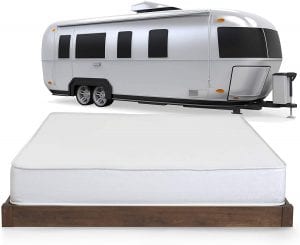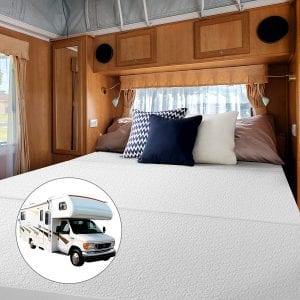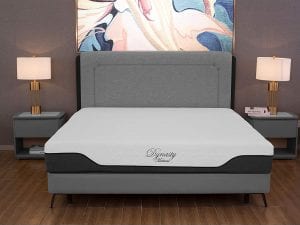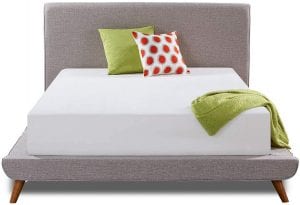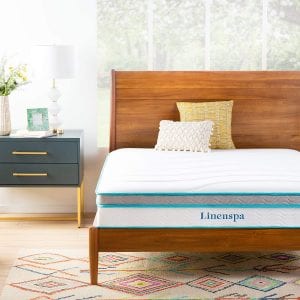The Best RV Mattress
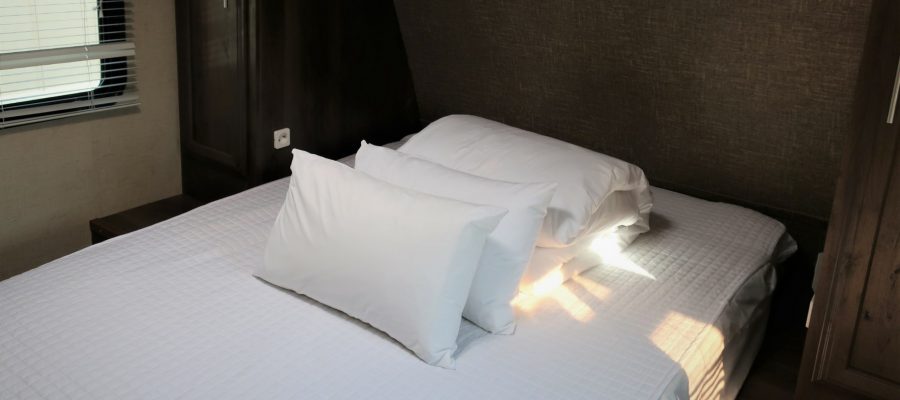
Our Review Process
Don't Waste Your Money is focused on helping you make the best purchasing decision. Our team of experts spends hundreds of hours analyzing, testing, and researching products so you don't have to. Learn more.
Our Picks For The Top RV Mattresses
- 1. Serenia Sleep Memory Foam RV Mattress, 8-Inch
- 2. FORTNIGHT BEDDING CertiPUR-US Certified Foam RV Mattress, 4-Inch
- 3. Best Price Mattress 4-Inch Trifold Memory Foam Short Queen RV Mattress
- 4. Dynasty Mattress 12-Inch CoolBreeze Classic Cooling Gel Memory Foam King RV Mattress
- 5. Live & Sleep Classic 10-Inch Medium Plush Firmness Short Queen RV Mattress
- 6. Linenspa 10-Inch Memory Foam Hybrid Short Queen RV Mattress
This RV mattress combines both support and comfort. A 2-inch memory foam layer rests on top of a 6-inch supportive base foam. Sleepers will love how the mattress is able to distribute their weight evenly and keep them cool throughout the night.
CertiPUR-US CertifiedThe open-cell construction of this RV mattress allows for maximum breathability.
When traveling, you'll want to go with this 4-inch RV mattress. It's designed to fold up when not in use, without losing its structure. The mattress is also free of harmful chemicals and constructed using a durable stitch-bond fabric that will hold it together for many years to come.
Most VersatileIn addition to using this RV mattress in your recreational vehicle, it also works well on a cot, folding bed or daybed.
This 4-inch trifold RV mattress includes a 1.5-inch memory foam top layer and a 2.5-inch high-density base foam layer. The cover is designed to prevent slipping while also making it easy to spot clean as needed. Sizes range from twin to California king.
Infused With Green TeaThis mattress is infused with green tea to provide a lasting freshness, as well as a calming effect.
This 12-inch mattress includes a 1.5-inch layer that includes 5 pounds of gel-infused open cell memory foam. There's also a high-density memory foam layer, a latex layer and a strong foam base layer for extra support. A zippered cover makes it easy to remove and wash as needed.
Gel-Infused Memory FoamThe gel-infused memory foam in this RV mattress helps keep you both cool and supported throughout the night.
Buying Guide
When you buy a recreational vehicle, it will likely come with a mattress, but you’ll quickly realize it’s not the best one you can sleep on. Fortunately, it’s easier than ever to upgrade your RV’s mattress with an affordable option you can order online.
But tracking down the right RV mattress can be challenging. There are some differences between the mattress you’d want for a bed in your home and one you’d want for an RV bed. For one thing, RV mattresses are shorter than their household counterparts. RV mattress sizes are fairly standard, but it’s always best to measure your existing mattress to make sure you’re getting the right fit.
The most important consideration will be comfort, though. You can easily find a mattress as comfortable as the one at home, but you’ll need to rely on the latest technology. Most mattresses these days use standard memory foam or gel-infused memory foam, rather than the traditional innerspring coils that once dominated the mattress industry.
Even with memory foam, though, one size doesn’t fit all. Look at how the mattress is constructed, including the thickness of each layer. Some offer a supportive core beneath all that memory foam to ensure you’re not only comfortable, but that you also have support for your body while you sleep.
What to Look For
- If you purchase a boxed mattress, opening it inside the RV will save you the trouble of having to move it once it’s fully expanded.
- Boxed mattresses can take up to 72 hours to expand to their full size, so make sure you plan ahead if you have a trip coming up.
- When it comes to the foam layers in a mattress, more really is more. At least three layers are recommended to get the right combination of support and comfort.
- If you tend to sleep hot, look for a mattress with cooling properties. Cooling gel foams and convoluted foams are ideal for this.
- If you’re putting your RV mattress directly on the base of your bed, make sure it’s not designed specifically for use with box springs.
- Some RV mattresses have covers designed to either make them easy to clean or to resist slippage. You can also find mattresses with covers that are removable to make them easy to wash when your trip is over.
- When you aren’t using your mattress, it’s best to take all bedding off and leave it uncovered, especially if you live in an area with high humidity. This will help keep moisture from building up in the mattress.
More to Explore
RVs have come a long way over the past century. The first RV, launched in 1910, was the Pierce-Arrow’s Touring Landau. The Landau was equipped with a bed, a chamber pot for a toilet and a sink that folded down from behind the driver’s seat. Around that same time, campers from Trailer Works and Auto-Kamp Trailers hit the market. These early RVs were called auto campers and were designed more for camping than traveling to tourist destinations.
Around the Great Depression, the popularity of campers waned, but travel trailers did become a great resource for inexpensive housing. But a second RV boom hit in the 1960s, as Winnebagos became popular and the interstate system expanded across America.

